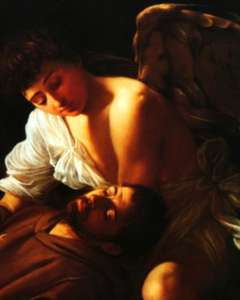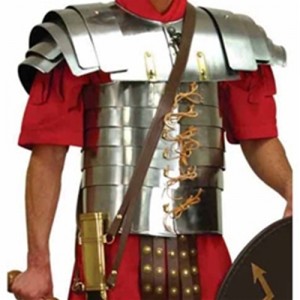====================
A sermon offered on Feast of St. Francis of Assisi, October 4, 2015, to the people of Trinity Cathedral, Cleveland, Ohio.
(The lessons for the day are Jeremiah 22:13-16, Psalm 148:7-14, Galatians 6:14-18, and Matthew 11:25-30.)
====================
 When I was learning the art of preaching, my instructor was a fan of the old Barthian aphorism that a homilist should enter the pulpit with the newspaper in one hand and the Bible in the other. So here I am, newspaper and Bible at the ready, and opening the first I find glaring at me the headline you all have also seen: another mass shooting in America – the 294th multiple gun homicide of the year. Like many, if not most, of the clergy here this evening I have preached too many sermons about mass murder and gun control: after Columbine, after the Aurora theater, after the Milwaukee gurdwara, after Sandy Hook Elementary School, after Mother Emanuel Church, after so many others . . . . I’m sorry; my heart is broken and my prayers arise for the Umpqua College victims, their families, and their community. But, even as we gather to remember the Little Poor Man of Assisi, in whose name we often pray, “make me a servant of your peace,” I just don’t have another mass-murder-gun-control sermon to offer.
When I was learning the art of preaching, my instructor was a fan of the old Barthian aphorism that a homilist should enter the pulpit with the newspaper in one hand and the Bible in the other. So here I am, newspaper and Bible at the ready, and opening the first I find glaring at me the headline you all have also seen: another mass shooting in America – the 294th multiple gun homicide of the year. Like many, if not most, of the clergy here this evening I have preached too many sermons about mass murder and gun control: after Columbine, after the Aurora theater, after the Milwaukee gurdwara, after Sandy Hook Elementary School, after Mother Emanuel Church, after so many others . . . . I’m sorry; my heart is broken and my prayers arise for the Umpqua College victims, their families, and their community. But, even as we gather to remember the Little Poor Man of Assisi, in whose name we often pray, “make me a servant of your peace,” I just don’t have another mass-murder-gun-control sermon to offer.
So I want to tell you about the other headline that grabbed my attention earlier in the week. The hairstyle commonly known as the “man-bun,” which described as “typically worn with hair shaved on the sides of the head with a top-knot worn in the middle,” has been banned at Brigham Young University’s Rexford, Idaho, campus. According to the school’s “Student Honor Administration,” the man-bun is not consistent with the school’s dress code; it is no considered “an extreme hairstyle . . . just something that deviates from the norm.” (BYU-Idaho Scroll)
The BYU action reminded me of a story the late Senator Sam Ervin used to tell about a rather puritanical North Carolina preacher whose ministry bridged a time when women’s hairstyles were changing and women were beginning to wear their hair up in buns and this preacher found that most objectionable. It was, he thought, wanton and sinful for women to tempt men by exposing the curve of their shapely and attractive necks, and so he preached against this “modern” hairstyle. He chose as his text the famous admonition of the Savior Himself: “Top knot, come down!”
“At the conclusion of his sermon an irate woman, wearing a very pronounced topknot, told the preacher that no such text could be found in the Bible. The preacher thereupon opened the Scriptures to the seventeenth verse of the twenty-fourth chapter of Matthew and pointed to the words: ‘Let him which is upon the house top not come down to take anything out of his house.’” (Schutz, C., Political Humor: From Aristophanes to Sam Ervin, Fairleigh Dickinson Univ Pr, 1976, p. 42)
That story has nothing to do with St. Francis, but it does illustrate the quandary I felt when considering the lessons assigned to this feast. I don’t want to accuse those who selected these lessons of decontextualizing Scripture quite so badly as Sen. Ervin’s preacher . . . but let’s be honest: these traditional lessons have been selected less because they convey a gospel message than for their superficial reminders of Francis. Clearly, this is true of the epistle in which Paul claims “I carry the marks of Jesus branded on my body,” a reminder that late in his life Francis bore the Stigmata. Similarly, the Psalm reminds us of Francis’s Canticle of Brother Sun; the reading from Jeremiah, of his service to the needy.
One supposes the gospel lesson was similarly chosen because Jesus’s dismissal of the “wise and intelligent” reminds us that Francis, who came from a wealthy family and could have lived among the educated elite, chose instead a life in solidarity with the voiceless, uneducated poor.
But, when the first words I read in a gospel lesson are “At that time” my curiosity is immediately piqued! “What time?” I want to know. Our evangelist contextualized these words of Jesus, and I want to know what that context is. I hope you do, as well, because I’m about to tell you; we are going to untie this “top knot”.
Chapter 11 of Matthew’s Gospel, the end of which constitutes our lesson, is a discrete literary unit which opens with messengers from John the Baptist asking Jesus if he is the anticipated messiah. Jesus’s reply is, “Tell John what’s happening: the blind see, the lame walk, the mute speak, the dead are raised.” He then turns to those who are with him and says, “By the way, when you went out to the Jordan to see John, what were you expecting?”
He answers his own question, “You expected to see a prophet, and that’s what you got and more.” But, he reminds them that they rejected John because of his asceticism: “John came neither eating nor drinking, and they say, ‘He has a demon.'” (v. 18) But when Jesus came, “eating and drinking, … they say, ‘Look, a glutton and a drunkard, a friend of tax-collectors and sinners!'” (v. 19) They didn’t want the tough asceticism of John, nor did they did want the lighter touch of Jesus.
Why? Because both challenged the status quo; to follow either would have meant changing the rules! John’s way would have required them to renounce worldly pleasure; Jesus’s would have meant welcoming everyone including (heaven forbid!) sinners. They didn’t want to change the rules. They didn’t want to deviate from the status quo. They just wanted someone to bless them the way they were.
Jesus compares them to children who can’t make up their minds, “children sitting in the market-places and calling to one another, ‘We played the flute for you, and you did not dance; we wailed, and you did not mourn.'” (v. 16-17) They are like children who cannot decide whether they want to hold a pretend funeral or a make-believe wedding and end up doing nothing. Australian theologian Bill Loader calls them “the religious wise who seriously go about trying to protect God,” to maintain the status quo. They are the rule-makers and the rule-keepers who miss the point.
In their book The Unblocked Manager (Gower:Brookfield, VT, 1996), Dave Francis and Mike Woodcock make the argument that in business an overly-serious obsession with rules, with established norms, is not compatible with playful creativity and receptivity, that such an attitude inhibits communication and saps new ideas of their excitement, vitality, and strength. St. Francis said much the same thing according to his first biographer, Thomaso da Celano: “It is the devil’s greatest triumph when he can deprive us of the joy of the Spirit. He carries fine dust with him in little boxes and scatters it through the cracks in our conscience in order to dim the soul’s pure impulses and its luster.” (Quoted in Dorothee Solle, The Silent Cry: Mysticism and Resistance; see also, Celano, Second Life, Ch. LXXXVIII.125) That’s what had happened to Jesus’s audience in Matthew 11; they were the rule-makers and the rule-keepers who had been sprinkled with Satan’s powder of unmitigated seriousness.
So Jesus gets really personal and really pointed with them! He condemns three particular communities, pronouncing woes upon Bethsaida, Chorazin, and Capernaum, saying of the first two that “if the deeds of power done in you had been done in Tyre and Sidon, they would have repented long ago in sackcloth and ashes.” (v. 21) Tyre and Sidon were Philistine centers of pagan religion, business and commerce, and (apparently) prostitution; Isaiah, Jeremiah, Ezekiel, and other prophets foretold their doom and destruction as a result. Of Capernaum, Jesus says that because of its rejection of those same deeds of power “on the day of judgment it will be more tolerable for the land of Sodom than for you!” (v. 24) In that condemnation we get a hint of what has so angered Jesus for we know that Sodom’s sin was not about sexuality, despite centuries of misinformation on that score; Sodom’s sin was a failure of compassion, generosity, and hospitality. And those words clearly describe the “deeds of power” witnessed and dismissed by Chorazin, Bethsaida, and Capernaum.
Actually, we don’t really know what may have happened in Chorazin; it is not otherwise mentioned in the gospels. But we do know that in Bethsaida Jesus gave sight to a blind man and we believe that it was a few miles south of town at Tel Hadar that he fed the Four Thousand. We know that in Capernaum Jesus healed Peter’s mother-in-law and that a few miles south of there at Tabgha he fed the Five Thousand. Works of compassion, acts of generosity, instances of hospitality, these are the “deeds of power” scorned by the religiously “wise and intelligent,” the overly serious who go about enforcing rules, trying to protect the status quo, missing the point, and sapping Jesus’s gospel of its excitement, vitality, and strength.
We don’t know what the “wise and intelligent” of those towns may have said, what criticism they may have leveled, but on the basis of other conversations reported by the evangelists we can surely speculate. Were the healings done on the Sabbath so that they might constitute “work” in violation of the Law of Moses? Did the crowds at Tel Hadar and Tabgha wash their hands or did they eat in a defiled condition? Especially at Tel Hadar, might there have been Gentiles present? I’m sure we can with some accuracy suggest the concerns and critiques of the rule-keepers.
It is Jesus’s deeds of mercy and compassion that are the evidence of God’s gracious will, not rules! That is why Jesus told John’s messengers, “Look at what’s been done.” “Wisdom,” said Jesus, “is vindicated by her deeds.” (v. 19)
So this is the context of our gospel reading: “At that time, Jesus [angry and frustrated] said, ‘I thank you, Father, because you have hidden these things from’” these people, these overly-serious rule-keepers who cannot see that there is something more important than rules, who stifle compassion, and generosity, and hospitality, and mercy, and grace. (He’d run into this before. Remember when he visited his home synagogue at Nazareth? Mark tells us that “he could do no deed of power there. . . . And he was amazed at their unbelief.” [Mk 6:5-6]) At that time, he was offended that Capernaum, Bethsaida, and Chorazin had refused to respond. At that time their overly serious attitude and unbelief sapped his good news of its excitement, its vitality, and its strength.
Those overly-serious rule-keepers, the defenders of the status quo are with us today; at this time there are lots of Chorazins, Bethsaidas, and Capernaums. We read about them in the newspaper at this time.
Woe to you, Ft. Lauderdale and Philadelphia and Salt Lake City (and 20 other cities), who deny compassion and make it illegal to feed the homeless and the hungry just to protect your rules about public order!
Woe to you, House of Representatives, you deny health care to hundreds of thousands of poor women who need cancer screenings and perinatal care because of your rules about abortion funding (rules that weren’t being violated in any event)!
Woe to you, Rowan County, KY, you would deny two people who love each other the possibility of marriage because of your rule about homosexuality (a rule that isn’t the law of the land any longer)!
Woe to you, Rexburg, ID, you would deny self-expression to your students because of your petty dress code about hair!
Woe to you, America, you sacrifice the students in your colleges, the children in your schools, the movie-goers in theaters, the worshipers in your temples and churches just to protect a rule you call “the Second Amendment.”
At this time, this is the context within which we hear Jesus say, “I thank you, Father, because you have hidden these things from [the rule-makers, the rule-keepers, and the overly serious] and have revealed them to infants.” (v. 25)
Here’s an interesting thing . . . the Greek word translated as “infant,” the word nepioi, is unlike much of the koiné Greek of the New Testament; it is a word one also finds in classical Greek literature. In the Septuagint, it is used in the Psalms to translate the Hebrew words for the naive, the innocent, and the uneducated. In the Illiad and the Odyssey, it describes those who are socially and spiritually disenfranchised, who have no say not only in public affairs but in their own lives, as well. In all these contexts, it carries the connotation of voicelessness, of being not a rule-maker or a rule-keeper, but one burdened without one’s say by the rules of others.
Our saint today was born in late medieval Italy and christened Giovanni di Pietro di Bernardone. “Francis” was a derogatory nickname meaning “little Frenchman,” which apparently had been given him by his father because of his habit of dressing in the French style. He tried to live up to the conventions of his place and time first as merchant with his wealthy father, then as a soldier in the service of his city. Eventually, experiencing a mystical call and a religious conversion, he gave that all up. When his father hauled him before the Bishop of Assisi in legal proceedings, Giovanni renounced his inheritance and stripped naked in public, returning to his father the garments he had paid for. According to his second biographer, St. Bonaventure, “the servant of the most high King was left stripped of all that belonged to him, that he might follow the Lord whom he loved, who hung naked on the cross.” (Major Life, Ch. II.4) He left behind a life among the rule-makers and the rule-keepers, and began a life among the voiceless and the disenfranchised; he laid down the heavy burden of social convention to take up the yoke of Christ.
The life to which Jesus invited Francis, and to which he invites us, is not found in the rules; it is not found in the newspaper. It is found in the examples, in the “deeds of power” we encounter in the Bible. For Francis, it was a life full of risks and challenges, and Jesus has made it abundantly clear that it will be for us. He calls us to a life of humble service, a life of generosity, compassion, and hospitality, a life of mercy and grace.
To live, as Francis did, yoked to Jesus is to live free from the burden of sin, resting freely, deeply, and securely in God’s grace. To live yoked to Jesus is to be free from the need to prove oneself under some set of rules whether they be the mitzvoth of Moses, the social conventions of medieval Italy, the dress codes of a university, or the amendments of the Constitution. To live yoked to Jesus is to be the voice to the voiceless who always face the oppression and the opposition of the rule-makers and the rule-keepers.
It is to live the life described in the prayer attributed to St. Francis, which though not actually written by him, “admirably expresses the thought and spirit of Francis, ‘the Man of Peace.'” (Marion Habig, OFM, Francis of Assisi: Writer, in Omnibus of Sources, Franciscan Herald:Chicago, 1983, p 1930)
Will you join me in offering that prayer now?
Let us pray:
Lord, make us instruments of your peace.
Where there is hatred, let us sow love;
where there is injury, pardon;
where there is discord, union;
where there is doubt, faith;
where there is despair, hope;
where there is darkness, light;
where there is sadness, joy.
Grant that we may not so much seek to be consoled as to console;
to be understood as to understand;
to be loved as to love.
For it is in giving that we receive;
it is in pardoning that we are pardoned;
and it is in dying that we are born to eternal life. Amen.
(BCP 1979, Prayer No. 62, p 833)
It’s a beautiful prayer, but it’s essential to recognize that praying isn’t enough. Like Francis, we must live yoked to Jesus and be the voice of the voiceless in answer to the rule-keepers. Amen.
====================
A request to my readers: I’m trying to build the readership of this blog and I’d very much appreciate your help in doing so. If you find something here that is of value, please share it with others. If you are on Facebook, “like” the posts on your page so others can see them. If you are following me on Twitter, please “retweet” the notices of these meditations. If you have a blog of your own, please include mine in your links (a favor I will gladly reciprocate). Many thanks!
====================
Father Funston is the rector of St. Paul’s Episcopal Church, Medina, Ohio.
 So here’s a thing that happened this week . . . . We prepared the bulletins for today; both the church secretary and I reviewed them and proof-read them and only after they’d been copied and folded that I saw something out of order with today’s Psalm (as printed in the bulletin). It’s Verse 10….
So here’s a thing that happened this week . . . . We prepared the bulletins for today; both the church secretary and I reviewed them and proof-read them and only after they’d been copied and folded that I saw something out of order with today’s Psalm (as printed in the bulletin). It’s Verse 10…. As photos of his lifeless body laying face down in the sand made their way instantaneously around the world, an international hew and cry was heard; in a phrase, the world said, “Refugees’ lives matter! Syrian lives matter!” In response to the death of that one, specific little boy, no one was heard to say, “All lives matter” . . . .
As photos of his lifeless body laying face down in the sand made their way instantaneously around the world, an international hew and cry was heard; in a phrase, the world said, “Refugees’ lives matter! Syrian lives matter!” In response to the death of that one, specific little boy, no one was heard to say, “All lives matter” . . . .  “This is neither the time nor the place . . . .”
“This is neither the time nor the place . . . .”  In the Education for Ministry program, the first year is spent reading the Old Testament, parts of which can be as dull as dirt! There are those long lists of genealogies, long catalogues of tribes and families, the lengthy and detailed instructions for making and erecting the tabernacle that the Hebrews carried along with them in the desert and, of course, a description of the Temple which Solomon built. In our EfM group, we sort of got into a habit of not reading those parts, of just acknowledging they were there but sort of skipping lightly over them. But it is there, earlier in the First Book of Kings from which our First Lesson is taken, a description of the building in which, in today’s lesson, Solomon places the Ark of the Covenant. Solomon’s Temple (the “First Temple”) was massive; it wasn’t really very big, but it was solid and substantial. It was built of huge blocks of solid stone; it had support beams made of whole cedar trees; it had immense fixtures and columns made of solid bronze and gold. In a word, it was a fortress!
In the Education for Ministry program, the first year is spent reading the Old Testament, parts of which can be as dull as dirt! There are those long lists of genealogies, long catalogues of tribes and families, the lengthy and detailed instructions for making and erecting the tabernacle that the Hebrews carried along with them in the desert and, of course, a description of the Temple which Solomon built. In our EfM group, we sort of got into a habit of not reading those parts, of just acknowledging they were there but sort of skipping lightly over them. But it is there, earlier in the First Book of Kings from which our First Lesson is taken, a description of the building in which, in today’s lesson, Solomon places the Ark of the Covenant. Solomon’s Temple (the “First Temple”) was massive; it wasn’t really very big, but it was solid and substantial. It was built of huge blocks of solid stone; it had support beams made of whole cedar trees; it had immense fixtures and columns made of solid bronze and gold. In a word, it was a fortress!

